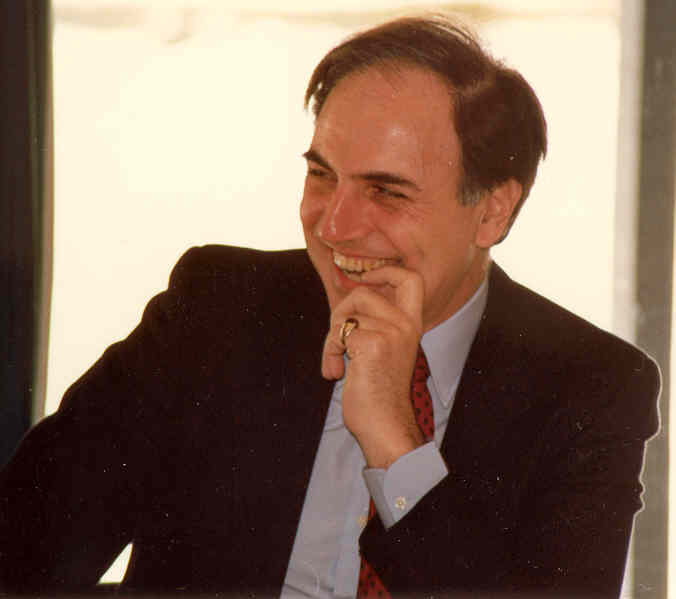The Jewish Humanist Volume 29, No. 5, December 1992
The Fourth Biennial Conference of the International Federation of Secular Humanistic Jews
It was a memorable event. Delegates from nine countries assembled in the Khan theater to proclaim the commitment to a cultural Judaism without God. It was obvious that progress had been made during the last six years, ever since our first meeting in Detroit in 1986. We had increased in number. We had defined our ideology. We had elevated our visibility in the Jewish world. We had created an international Institute to train the leaders and educators we so desperately needed.
“On the way“ to Jerusalem we had met in Brussels in 1988 and in Chicago in 1990. At each of these events we sought to reinforce the purpose of the Federation. We wanted to bring together all the secular and humanistic Jews in the world and make them part of one movement. We wanted our voice and our presence to be recognized and acknowledged. We wanted to do together what we would not be able to do alone.
There were many highlights of the conference.
There was the Khan Theater, a Jerusalem landmark, Filled with people, many of them young, eager to identify with the cause of a cultural Judaism.
There was the babble of tongues – Hebrew, English, Russian, French and Italian – that made you feel the truly international character of our movement and gave the moment the excitement of diversity.
There was Naomi Hazzan, Member of Parliament, friend of Shulamit Aloni, fiery defender of the separation of religion and government, calling for the end to the wicked regime of Orthodox control over Israeli life.
There was Yizhar Smilansky, Famous poet and writer, tall, white- haired and charismatic delivering his impassioned denunciation of racism and militarism by rewriting the book of Joshua and reciting the text in staccato and relentless outbursts.
There was Haim Cohn, former senior judge of the Israeli Supreme Court, revered jurist and civil libertarian, Honorary president of the International Institute for Secular Humanistic Judaism, receiving his award as our role model Humanistic Jew and offering a clear and unequivocal call for rational enlightenment in Jewish life.
There was the arrival of the delegates from the former Soviet Union, pioneers of Humanistic Judaism in the secular Jewish world of Eurasia, sharing with the crowd at the incredible success of their efforts in towns and cities of Russia and the Ukraine, speaking of the amazing possibilities for our movement in these newly opened lands.
There was the meeting with the Russian immigrants who have come to Israel, hundreds of them, who have found an intellectual and spiritual home and Humanistic Judaism, Who were filled with endless questions about what we do in North America.
There was Jerusalem Deputy Mayor Yekutieli, descendent of a prominent Iraqi family and militant secularist, who told us about his victories against Orthodox intimidation in his city of yeshivas and about how it was possible for determined humanists to mobilize their followers successfully in defence of their civil rights.
There was Danny Garbarz of Paris, university student and leader of the French youth movement for Humanistic Judaism, Energetic and brilliant, who shared with us his plans to mobilize Jewish young people all over the world for a secular commitment to Jewish identity.
There was Meron Benvenisti, Controversial writer, intellectual and former political leader, who boldly proclaimed at a celebration luncheon for the 25th anniversary of the reunification of Jerusalem that there was nothing to celebrate, that Jerusalem remained hopelessly divided between Jews and Arabs and that only a piece which involved ethnic equality, mutual respect and the sharing of land would really work.
There was the intimate closing session when we explored together the texts of the new Secular Humanistic Anthology, tasting the words of Spinoza, Einstein and Tchersiklovsky and experiencing the excitement of finding our place and the tradition of Jewish inspiration.
There was the special moment in the kibbutz library of Aryeh Ben Gurion, Nephew of the first prime minister of the Jewish state, all of us standing before the documents and books which represented eighty years of secular Jewish celebration in the world of kibbutz life, And realizing the vast wealth of Jewish creativity that lay at the foundation of our movement.
There were too many high points to record. But all of them were part of a significant series of events that made up this conference.
For the first time Secular Humanistic Judaism received considerable attention from the Israeli press and media. The visibility of the movement took a quantum jump before the eyes of the Israeli public.
For the first time the vast region of Eurasia entered our movement. The Jews of the former Soviet Union, by virtue of 75 years of secular education, are an enormous pool of potential members and workers for our movement. Many Jews will leave the area. But most will stay. And if they want to be Jewish, Humanistic Judaism is the best and most honest way for them to express their Jewish identity. The Federation published a statement to that effect.
For the first time the Federation held a meeting in an Israel which was no longer under the control of a government beholden to the orthodox fundamentalists. Rabin is in power. And two of the founding members of the Israeli Humanistic Jewish movement, Shulamit Aloni and Yair Tsaban now hold important posts in the government. Their enemies have made an issue of their secularism. But they are determined to use their influence to resist the forces of religious reaction and self-ghettoization in the Jewish state.
We have every reason to feel optimistic about our movement, despite the power and determination of our opposition. Hopefully, the Spirit of the Jerusalem conference will serve to make us bolder and more assertive. WE have an important message for the Jewish world. Our solidarity with Humanistic Jews around the world will make it louder and clearer.

